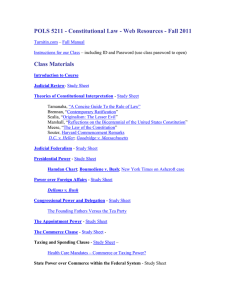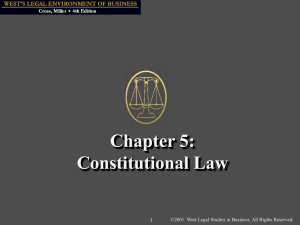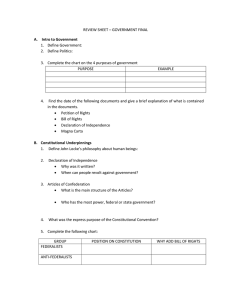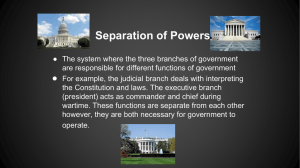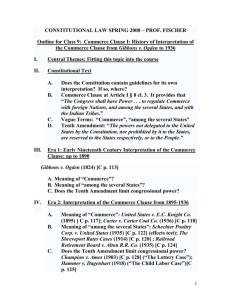Document
advertisement
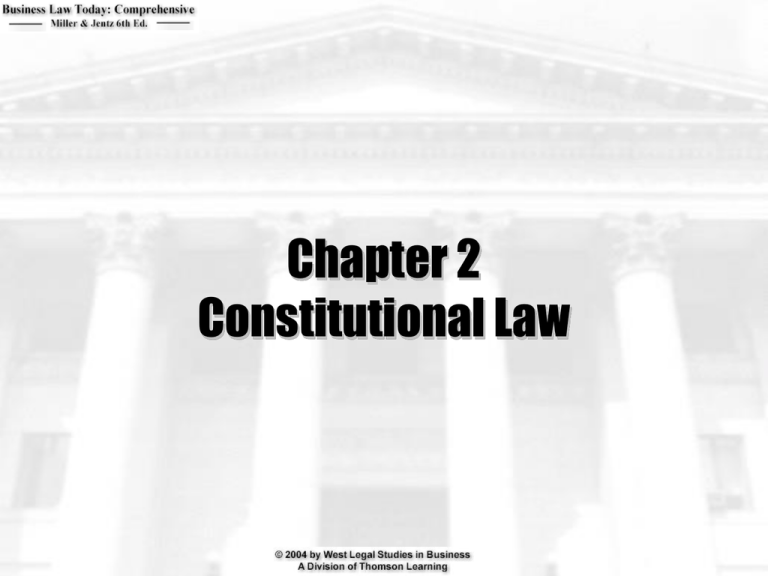
Chapter 2 Constitutional Law Learning Objectives What is the basic structure of the United States government? What clause gives the federal government the power to regulate commercial activities among the states? What is the Bill of Rights? What freedoms are guaranteed by the First Amendment? What does “due process” mean? 2 Constitutional Powers of Government Federalism: The federal constitution was a political compromise between advocates of state sovereignty and central government. Separation of Powers: Executive, Legislative and Judicial. Provides checks and balances. Legislative: enacts laws Executive: enforces laws Judicial: declares laws/actions unconstitutional. 3 The Commerce Clause U.S. Constitution gives Congress the power to “regulate Commerce with foreign Nations, and among the several States, and with the Indian tribes.” (Art 1 § 8) Greatest impact on business than any other Constitutional provision. 4 The Commerce Clause Gibbons v. Ogden (1824) To Chief Justice Marshall, commerce meant all business dealings that substantially effected more than one state. The national government had the exclusive power to regulate interstate commerce. Today: commerce clause applies to ecommerce internet transactions. 5 The Commerce Clause Expansion of Federal Regulatory Powers under Commerce Clause: Wickard v. Filburn (1942). Purely local production, sale and consumption of wheat was subject to federal regulation. Heart of Atlanta Motel v. U.S. (1964). Motel that provided public accommodations to guests from other states was subject to federal civil rights legislation. 6 The Commerce Clause Commerce Clause Today: Theoretically: the federal government has unlimited control over all business transactions since any enterprise (in the aggregate) can have a “substantial effect” on interstate commerce. Practical Limits: Supreme Court has curbed federal regulatory powers in U.S. v. Lopez (1995) and U.S. v. Morrison (2000). 7 Regulatory Powers of the States Tenth Amendment reserves all powers to the states that have not been expressly delegated to the national government. State have inherent “police powers.” Police powers include right to regulate health, safety, morals and general welfare. Includes licensing, building codes, parking regulations and zoning restrictions. 8 Dormant Commerce Clause U.S Supreme Court has interpreted commerce clause to give national government exclusive power to regulate. States only have a “dormant” (negative) power to regulate interstate commerce. Dormant power comes into play when courts balance state’s interest vs. national interest, e.g., internet transactions. 9 The Supremacy Clause Supremacy Clause: Article VI of the Constitution provides that Constitution, laws and treaties of the United States are the “supreme law of the land.” Concurrent: in few areas, both states and federal government share powers. Preemption: when Congress chooses to act in a concurrent area, federal law preempts state law. 10 Taxing and Spending Powers Article I Section 8: Congress has the power to “lay and collect taxes, duties, imposts and excises.” Today, if federal tax has a reasonable relationship to revenue production, it will be held constitutional. Congress can spend the revenues on any express or implied constitutional power. 11 Business and the Bill of Rights 1791: Ten written guarantees of protection of individual liberties from government interference. Originally, Bill of Rights only applied to the federal government. Later, the Bill of Rights was “incorporated” and applied to the States as well. Some protections apply to businesses. 12 Free Speech Right to Free Speech is the basis for our democratic government. Free speech also includes “symbolic” speech, including gestures, movements, articles of clothing. Texas v. Johnson (U.S. 1989): burning the American flag is protected symbolic speech. 13 Corporate Free Speech Corporate commercial speech (advertising) is given substantial protection. Government restrictions must: Seek to implement substantial government interest Directly advance that interest and Must go no further than necessary to accomplish. Corporations also have protected political speech (although not to the degree of a natural person). 14 Unprotected Speech U.S. Supreme Court has held that certain speech is NOT protected: Defamatory speech Threatening speech that violates criminal laws Fighting Words Obscene Speech is patently offensive, violates community standards and has no literary, artistic, political or scientific merit. 15 Online Speech Protected or Unprotected? Some of Congress’ attempts to protect children from online pornography have been ruled unconstitutional restriction on free speech. • Communications Decency Act (1996) • COPA (1998-challenged, in court) • Children’s Internet Protection Act (2000) which requires filters for computers in public libraries and public schools). Challenged, in court. What about “hate” speech on the web? 16 Freedom of Religion First amendment guarantees that “Congress shall make no law respecting an establishment of religion, or prohibiting the free exercise thereof…” Establishment clause: no state-sponsored religion or preference for one religion over another. Free Exercise: person can believe what he wants, but actions may be unconstitutional. 17 Due Process Due Process is both procedural and substantive. Procedural: any government decision to take life, liberty or property must be fair. Requires: Notice and Fair Hearing. Substantive: focuses on the content or the legislation (the right itself). Fundamental Right: compelling state interest. Non-Fundamental: rational relationship to state interest 18 Equal Protection 14th Amendment: A state may not “deny to any person within its jurisdiction the equal protection of the laws.” Means that government must treat similarly situated individuals (or businesses) in the same manner. Courts apply different tests: Minimum scrutiny-economic rights. Intermediate scrutiny. Strict Scrutiny – fundamental rights. 19 Privacy Rights Fourth amendment protects against unreasonable search and seizures. What about private information on the internet? Reno v. Condon (2000). Griswold v. Connecticut (1965) found a right to personal privacy implied in constitution, expanded in Roe v. Wade (1973). Website privacy policies. 20

